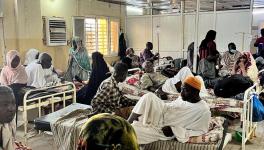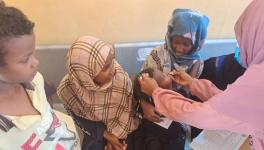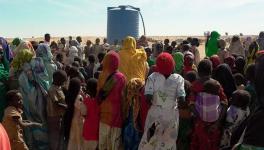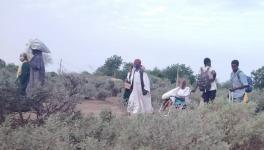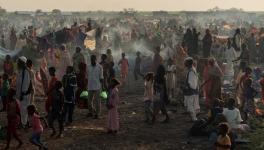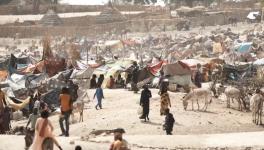Sudan War: Hundreds Killed in ‘Deadliest Single Bombing’
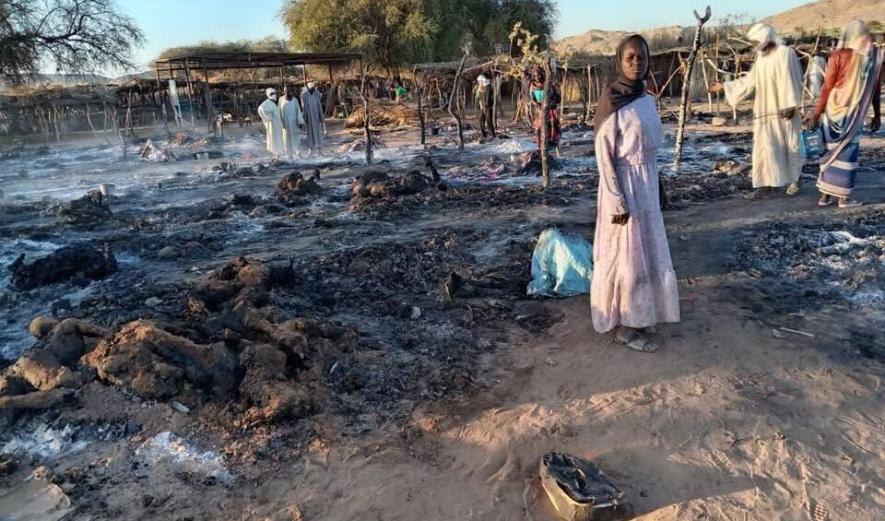
The market is near the city of El-Fasher, which is controlled by the army. Photo: Darfur Network for Human Rights
An airstrike by the Sudanese Armed Forces (SAF) on a busy market in the North Darfur state killed hundreds on March 24, in what has been described as the “deadliest single bombing since the beginning of the war” in April 2023.
Initial reports indicated about 60 deaths, but the death count has now “exceeded 350, with hundreds more injured and missing”, Adam Rojal, spokesperson of the General Coordination of Darfur Displaced People and Refugees told Peoples Dispatch. The SAF, he alleged, had deliberately chosen the weekly market day to inflict maximum damage.
“My Office has learned that 13 of those killed belonged to a single family, and that some of the injured are also reportedly dying as a result of the extremely limited access to healthcare,” the UN High Commissioner for Human Rights Volker Türk said in a statement on March 26.
“The market was bustling with life, mothers carrying their children, elderly men selling vegetables, and people going about their daily business. Then, without warning, we heard the deafening roar of a plane overhead. Within seconds, everything went dark. The air was thick with dust and the cries of the wounded. Bodies lay scattered across the ground,” 37-year-old Aisha, a survivor with injuries to an arm and leg, told the Darfur Network for Human Rights. “We are not fighters. We are just ordinary people struggling to live. Why are they bombing us?”
The market is located in the village of Tora, about 35 km north of the state capital El-Fasher, the last SAF foothold in the Darfur region. Its former ruling partner in the military junta turned enemy, the Rapid Support Forces (RSF) – which has taken over the other four states in the Darfur region – has besieged El-Fasher since mid-last year, cutting off the supply routes for food aid and causing a famine.
The famine is spreading to increasing regions of the state as both the warring parties, in an attempt to undermine the other’s position, have been indiscriminately bombing civilian spaces, including in markets – the SAF from the air and the RSF with artillery. Those markets spared of bombing, have largely run out of stock.
Tora had the only major market left with supplies for the people in and around El-Fasher to buy food and other essentials, Rojal said. On March 24, thousands had journeyed from different areas of the state to this weekly Monday market to stock up ahead of the ending of Ramadan, when an SAF warplane dropped a barrel bomb.
Pictures of the aftermath show charred bodies lying in the smoldering debris of the stalls in this market.
Two million already suffering extreme food insecurity in the state
The destruction of the last major market in the state is bound to worsen hunger and hasten the spread of famine in North Darfur, where two million people are already facing extreme food insecurity.
The United Nations Children’s Fund (UNICEF) said on March 26 that over 457,000 children in the state are suffering acute malnourishment. Almost 146,000 of them are in the deadly stage of Severe Acute Malnutrition (SAM).
IDP camps worst affected by famine
The worst affected are the camps for Internally Displaced People (IDP). Hundreds of thousands displaced during the Darfur Civil War in the 2000s when the SAF and the RSF’s precursor, the Janjaweed militias, committed mass atrocities together, were already living here in precarious conditions, dependent on food aid even before this war began in 2023.
Displacing 12 million more, this war has caused the world’s worst displacement crisis. In North Darfur alone, almost 1.7 million people have been displaced, including 60,000 in the last six weeks. Increasing numbers of the newly displaced have sought shelter in Zamzam, one of Sudan’s largest and oldest IDP camps, located on the outskirts of El Fasher.
Its population doubled from 350,000 before this war to up to 800,000, increasing pressure on the limited food availability. Cut-off from supply after the RSF’s siege of El-Fasher last year, a famine was declared here in August 2024.
Since then, the UN’s World Food Program (WFP) has only been able to transport one convoy of aid to the camp amid the fighting. Late last month, the WFP complained that it was forced to halt “the distribution of life-saving food and nutrition assistance” because the “escalating violence left WFP’s partners with no choice but to evacuate staff for safety.
Over four weeks have passed since its Regional Director for Eastern Africa and acting Country Director for Sudan, Laurent Bukera, warned that “without immediate assistance, thousands of desperate families in Zamzam could starve in the coming weeks.” Nearly half a million more IDPs are also on the brink in the Abu Shouk camp, where famine was declared last December, along with El Salam camp in the state.
By May, the UN projects that five more areas in North Darfur, including the state capital El Fasher, may be in the throes of famine.
Water shortages worsen the plight of the starving
Water shortages have also become life-threatening, especially in Zamzam and Abu Shouk, added Rojal. “There are no means of transporting water from distant locations, nor are there spare parts and fuel to operate boilers” to purify the available water for drinking.
“Women and children stand in line from 4 am to 3 pm waiting for their turn to collect whatever little water there is,” he added. Unable to bathe and wash their clothes and cooking pots, many are becoming increasingly vulnerable to diseases, which are life-threatening when victims are already suffering malnutrition.
“We must resume the delivery of life-saving aid,” emphasized Bukera. “For that, the fighting must stop, and humanitarian organizations must be granted security guarantees.”
No end in sight after nearly two years of war
However, there are few signs of the guns stopping anytime soon. Earlier, following 48 hours of fighting on March 20 and 21, the RSF captured the town of Al-Malha, killing dozens of civilians and displacing another 15,000 households.
200 km to the northeast of El-Fasher, Al-Malha is the northernmost urban area before the desert stretching to Libya, from where Khalifa Haftar has been reportedly supplying the RSF with arms and fuel. The capture of this town therefore reinforces the RSF’s strategic advantage against the SAF in North Darfur.
The SAF, on the other hand, has also scored an important victory, retaking Sudan’s capital Khartoum on March 26, expelling the RSF after intense battles.
“Both sides are killing citizens because they were essentially one entity, killing citizens together. They are devoid of morality and humanity,” laments Rojal.
Courtesy: Peoples Dispatch
Get the latest reports & analysis with people's perspective on Protests, movements & deep analytical videos, discussions of the current affairs in your Telegram app. Subscribe to NewsClick's Telegram channel & get Real-Time updates on stories, as they get published on our website.













